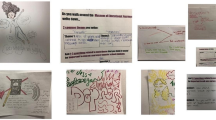Abstract
This paper explores how schools with students from power-marginalised positions—refugee, immigrant and working class—channel policy pressures in ways that aggravate students’ social-structural vulnerabilities. Drawing on interview data, we foreground voices of students who were selected into ‘accelerated’ academic programs in three Australian secondary schools. We relate their experiences and analyses to conceptual diagnoses of how historic conditions of current times are ‘cruel for optimism’ (Berlant), inciting social institutions to multiply ‘little miseries’ (Bourdieu), as meritocratic promises of upwardly mobile ‘opportunity bargains’ through schooling prove to be ‘opportunity traps’ (Brown). We highlight students’ pessimistic readings of likely futures in relation to school promises of ‘good futures’, as well as astute readings of how school competition strategies—caring for market ratings and reputations more than students—sort some to ‘achieve highly’ while chasing others, seen as ‘lesser-’ and ‘non-achieving’, onto devalued vocational paths and/or to other schools. We surface pressuring tactics that bear unequally, sometimes punitively, on differently sorted students. We conclude with suggestions for ethically re-purposed curriculum to engage all students—across diversities and working with teachers and community members—in practices of voice, participation and agency to address problems that matter for future life-with-others.
Similar content being viewed by others
Code Availability
Not Applicable.
Notes
ATAR stands for the Australian Tertiary Admission Ranking which universities in Australia use to select for program entry. It is not a mark but ranks a student’s result in relation to all others in the state, based on subjects studied in the final year/s of schooling. Each state/territory has variations in what ‘counts’; but there is a national system of cross-state agreements for ranking.
ARC Project (DP120101492), Capacitating student aspirations in classrooms and communities of a high poverty region. Chief Investigators: Lew Zipin, Marie Brennan, Trevor Gale and Sam Sellar, with Research Assistance from Iris Dumenden. Ethical clearance was provided by Victoria University (HRE12/58), and permission to research with the schools by the Department of Education and Early Childhood Development.
PISA, the Programme of International Students Assessment, tests country samples of 15-year-olds.
VCE is the main certificate offered in the state of Victoria, Australia, for completion of secondary schooling. VCAL offers an alternative end-of-school certificate, oriented to vocational education and training. VCAL will be phased out by 2023, but this was not planned at the time of our study.
References
Alexander R (2008) Essays on pedagogy. Routledge, London
Berlant, L (2011) Cruel optimism. Durham, NC: Duke University Press. Bourdieu, P (1998) Practical reason: on the theory of action. Translated by R. Johnson. Cambridge, UK: Polity.
Bourdieu P (1999) The weight of the world: social suffering in contemporary society. Polity, Cambridge
Brennan M, Mayes E, Zipin L (2021) The contemporary challenge of activism as curriculum work. J Educ Admin Hist. Online first: https://doi.org/10.1080/00220620.2020.1866508
Brown P (2003) The opportunity trap: education and employment in a global economy. Eur Educ Res J 2:141–177
Brown P (2013) Education, opportunity and the prospects for social mobility. Br J Sociol Educ 34(5–6):678–700
Brown P, Lauder H, Ashton D (2011) The global auction: the broken promises of education, jobs and incomes. Oxford University Press, New York
Cobbold T (2020) Education resource gaps in Australia remain amongst the largest in the world. www.saveourschools.com.au. Accessed 29 Nov 2020
Delpit L (1988) The silenced dialogue: power and pedagogy in educating other people’s children. Harvard Educ Rev 58(3):280–298
Gonski D (2011) The review of funding for schooling: final report. Canberra: Department of Education, Employment and Workplace Relations
Moll LC, Amanti C, Neff D, González N (1992) Funds of Knowledge for teaching: using a qualitative approach to connect homes and classrooms. Theory into Practice 31(2):132–141
Sahlberg P (2016) The Finnish paradox: equitable public education within a market economy. In: Adamson F, Åstrand B, Darling-Hammond L (eds) Global education reform: How privatization and public investment influence education outcomes. Routledge, New York, pp 110–130
Sellar S (2013) Hoping for the best in education: globalisation, social imaginaries and young people. Soc Altern 32(2):31–38
Taylor S, Zipin L, Brennan M (2020) Students researching ‘Problems That Matter’ in their communities. Forum 62(2):195–206
Zipin L (2013) Engaging middle years learners by making their communities curricular: A funds of knowledge approach. Curriculum Perspectives 33(2):1–12
Zipin L (2017) Pursuing a problematic-based curriculum approach for the sake of social justice. S Afr J Educ 69:67–92
Zipin L (2020) Building curriculum knowledge work around community-based “problems that matter”: Let’s dare to imagine. Curriculum Perspect 40(1):111–115
Zipin L, Brennan M (2019) Pursuing pragmatic-radical curriculum democracy: Students as co-researchers on problems that matter. In: Riddle S, Apple MW (eds) Re-imagining education for democracy. Routledge, London, pp 56–73
Zipin L, Brennan M (2020) Introduction - knowledge-and-ethics: strong curriculum values both, together. Point and Counterpoint on Knowledge and Ethics in Curriculum. Curriculum Perspect 40(1):83–86
Zipin L, Brennan M, Sellar S (2020) Young people pursuing futures: Making identity labors curricular. Mind Cult Act 28(2):152–168
Funding
This paper is supported by the Australian Research Council (DP 120101492).
Author information
Authors and Affiliations
Corresponding author
Ethics declarations
Ethics Approval
This study was performed in line with the principles of the Declaration of Helsinki. Approval was granted by the Ethics Committee of Victoria University; no. HRETH 12/58; date approved, 2012; amended with interview protocols approved February 2013.
Informed Consent
In line with ethics approval from Victoria University, student participants received ethics-approved written and verbal information about the study and signed consent forms for all data collections, counter-signed by parents/guardians. Adults involved in the study received ethics-approved information and signed consent forms.
Conflict of Interest
On behalf of all authors, the corresponding author declares no competing interests.
Rights and permissions
About this article
Cite this article
Zipin, L., Brennan, M. & Trevorrow, D. Aggravating Students’ Structural Vulnerabilities: Cruel Miseries of Selection for ‘Success’ in Schools with Power-Marginalised Intake. JAYS 4, 401–420 (2021). https://doi.org/10.1007/s43151-021-00054-4
Received:
Revised:
Accepted:
Published:
Issue Date:
DOI: https://doi.org/10.1007/s43151-021-00054-4




